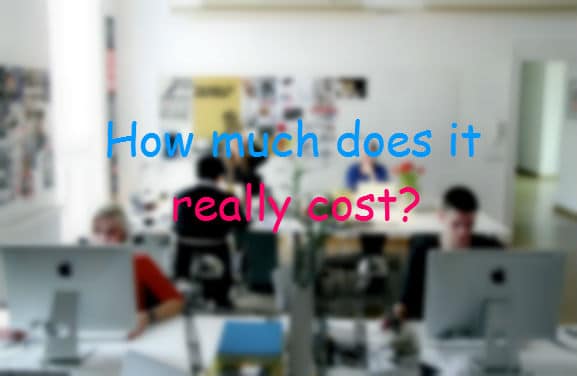A WordPress website can be set up in as little as 2 hours. And with so much documentation, presentations, how-to videos and blogs, it shouldn’t really cost anything to get a website going.
But now there are more than a billion other websites in the world and growing every second. You are just one of them. How do you differentiate yourself? How do you stand out?
If the aim is just to get a website up, sure, it should be cheap. But if you are trying to build a business around it, and if you really want your website to matter, an appropriate investment is required, just like any other business.
If setting up a brick and mortar car showroom takes 6 months to setup and cost hundreds of thousands of dollars probably, why should setting up a car selling marketplace website cost any less? A website will not burden you with tons of operational and fixed costs like rent, utilities etc. which will probably save you millions over time, and that is the real saving.
It does definitely cost a lot less. A lot less effort, less time and less money too, but if you are expecting the same results, you better not underestimate its value. You have got to give it the same level of importance and commitment.
How to Set the Right Budget?
It is important that you have a budget. You can’t just go by ‘as cheap as possible’ phenomena because you will need to make a lot of choices, for example,
- Choosing whether to get a custom design or buying an off-the-shelf theme.
- Finding a developer to configure the theme on crowded marketplaces like Elance or Upwork, where you will be bombarded with bids ranging from $20 to $2000.
- Finding a hosting provider and many other small choices.
Even if, by using an off-the-shelf theme, for as little as $50 and getting someone to setup the theme for another $50, you are able to put together a professional looking website, it doesn’t end there. Because a website is a living organism. It needs to be looked after, it needs maintenance. You could get stuck with a problem as simple as the loading speed of your homepage and a rookie developer will not only mess up your code but eventually take more time compared to an experienced web developer.
Therefore, just like starting any other business, setting up a business website should have an allocated budget. It could be less or more, depending on how promising the returns are in your industry but a budget nonetheless is a must.
Here Are Some of the Points to Consider,
Revenue Model: What is the goal of this website? Is it an informational/brochure website just to show your clients that you exist on internet, or are you planning to sell stuff online? There is a HUGE difference between both and therefore the cost for both websites should reflect the difference.
Similarly, you could be just a blogger, trying to setup a niche website, where you can write about your passion and possibly sell some affiliate products relevant to your audience. This is totally different from a full blown, content-rich magazine style blog where you have the ability to have multiple authors, provide the ability for your users to signup/register as a member and contribute, have a discussion forum, manage affiliate ads from different multiple vendors and tons of other features.
Theme and Design: If you are going to create a website, lets say for selling children’s books and toys. Your target audience are the parents, but its hard to find an off-the-shelf theme that will appeal to your audience as most of these themes are based on business/portfolio looks. Besides, you would want to put in a personal touch here anyway, so you would rather invest on the design than anything else. On the other hand, if you are just planning to put up a website to showcase your photography work, going for an off-the-shelf theme may be a good option as long as it caters to all your needs.
Features and Customization: So you have decided to use WordPress for your website and now you are wondering what kind of features should you provide? For example,
- If you are going to have users signup and register, should you have Facebook/Twitter/Linkedin login as well?
- If you have a blog, should you not have a newsletter subscription feature too? if yes, then which plugin should you use? How to choose from millions of plugins out there?
- If its and Ecommerce website, which payment gateway should you use, how to integrate the payment gateway seamlessly? Which shipping service should you use? How to calculate shipping rates?
- What kind of social sharing plugin should you use on the blog?
- Should you provide multi lingual support?
- Should you have a customized feature that will give you an edge over your competitors?
WordPress is definitely FREE, and it is the most cost effective solution in most cases. However, you have got to realize that, what you are getting for free, is an amazing ‘Content Management System’ with tons of built in features, so you don’t have to re invent the wheel. You can add unlimited pages and blog posts from the back-end without messing anything up and you can add content/images/videos to your pages, may be even tweak your layout a little bit. This is where you save the time and money, because they have thought of every little detail in creating these features and they keep improving, so you have a basic framework and a strong foundation to build a great website. What you don’t get for free is the customization and if you were to create a website without using WordPress, it would probably cost twice or thrice as much.
On-going Maintenance and Support: If you are using a paid plugin or a theme, most of them will provide general support and updates. However, what they don’t or can’t afford to provide is a one-on-one support to your specific issues. If the paid plugin you are using has a conflict with any other plugin on your website, then the best they can do is, identify the problem for you and let you know. You do need an on-going support and maintenance for the following reasons,
- Making sure that the plugins and themes are updated to the latest versions to avoid security threats
- Timely backup of your website data. Think of this as a health insurance, you don’t always need it, but when you do, you will be glad you had it taken care of.
- Checking your contact forms and other forms on the website.
- Checking your on-page SEO and page loading speed.
- Website migration and server handling
- Database Maintenance and Optimization
- Troubleshooting other issues throughout the website.
How Much Should This All Really Cost?
Now just for the sake of explanation, let us consider two different kinds of approaches.
The ‘As Cheap as Possible’ Strategy:
So if you were to use this strategy, you would probably start by
- Posting a job on Elance/Upwork or other similar platforms,
- Get bombarded by tons of bids with such a wide price range, you will be confused where to start and how to gauge the developers.
- You don’t know if the websites that they are showing you as an example of their work are really theirs or just a theme slapped on a domain name. Even if its custom work, who is to say that they probably just fixed a small bug on the website, or created the whole website.
- Chances are you will get attracted by an ambitious individual who just took up an online WordPress coding course and is charging $7/hour to build his portfolio.
- A beginner level developer, in my experience will take thrice as much time to build the same thing an experienced developer will. Not to mention, all the bugs that will later come up in the code and the loopholes that he may have left for security threats will all add up as additional cost.
- You will probably be fascinated by their offers of providing you a premium theme for free (illegally), and even some premium plugins. However, the next time the theme/plugin author releases an update, you will be running around like a chicken with its head cut off.
- Since you are working with an individual, anytime you need some design work, or front-end (HTML/CSS) issue, your freelancer will most likely bite more than he can chew.
- Last but not the least, your freelancer can get offered a full-time job, lose his internet connection or break his laptop, and go missing in action for a long time during the project, or after the project is completed. In both cases, you could end up not only paying twice to get something fixed, but also waste a lot of time.
Now, not all of the above cases have to be true for all scenarios, but these points cover most of what may happen. You are likely to complete a normal website for say $1500 or less, but even this amount is wasted if its not used wisely and specially if its not providing any value.
A Well Thought Out and Realistic Strategy:
Here is how a more realistic approach would look like,
- An experienced and professional WordPress developer or a WordPress specialized agency will charge between $35/hour to $60/hour. You get what you pay for.
- They will most likely provide you with suggestions and recommendations even if it means losing your business. In other words, they will not rush into pulling money out of your pocket, because they think long term.
- A dedicated project manager will communicate with you and get the details of your project. If you are missing on some of the important details, they will help you cover it up. The project managers shouldn’t charge separately.
- The estimates you are provided with will be more realistic as they will be based on past experience, so you will have less chances of going over budget.
- They have personally used some of the most common plugins/themes, so their recommendation is based on facts.
- When you need customization with any of the plugins/themes, chances are they have done it before and they are likely to take a lot less time.
- Design, HTML/CSS, On-page SEO and even business analysts are in-house.
- Of course, they are not going to just disappear during or after the project, ever. They have a reputation to carry and they are probably pretty active on social media, specially Twitter, where a negative feedback could do a lot of harm.
Bottom line, if you really want to build a business around your WordPress based website, you should have a budget. In my experience, most people and even companies, either underestimate the value or don’t really have the budget that it takes, though it’s not their fault. A professional WordPress developer or an agency can help you determine the cost to build a WordPress website.
Please leave your comments below if you want to share your experiences or even get advice on your project.




4 thoughts on “How Much Should a WordPress Website Cost?”
Such a great article, thanks for explaining things in so much detail and opening up about your process and price, there are not many articles written on this topic with such openness. The only thing that I would have to disagree with would be the fact that you said a photographer could use a theme to display his/her work, I think nobody should ever use a theme if they take their business seriously.:-) but that’s just me.
It is very appropriate for a business to use a theme. Businesses do it all the time. Using just a bit of CSS, even an inexperienced user can change the look and feel of a theme so that it is almost unrecognizable from the original.
And it doesn’t have to be expensive to set up and use a website appropriately. With a little bit of research, almost anybody can set up and run a successful business website using WordPress.
Does it take work? Of course. Just like anything does that’s worth doing. But the knowledge is readily available to anyone who seeks it out.
Hi Eric, thank you for your feedback. I checked out your blog too and I appreciate the work you are doing there 🙂
Like I mentioned in the post, most of the times, working with an off-the-shelf theme could be it. But when you are building a business that hinges on your website, for example a car selling marketplace or an event management portal or an Ecommerce website, you do need customization and professional support.
I have had clients, who were taking care of their website for a long time on their own, until they started growing and wanted someone else to take care of their website maintenance so that they can go on and do other things.
But I do get your point. If you are just starting out, it is totally possible to get a website going, on your own. The internet is filled with free resources and there are a ton of forums/communities where you might turn for WordPress help, as I mentioned in my other post, https://wooninjas.com/wordpress-help/